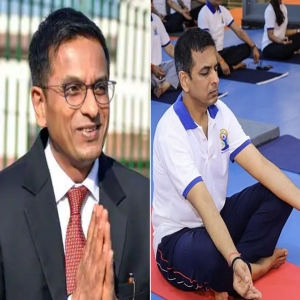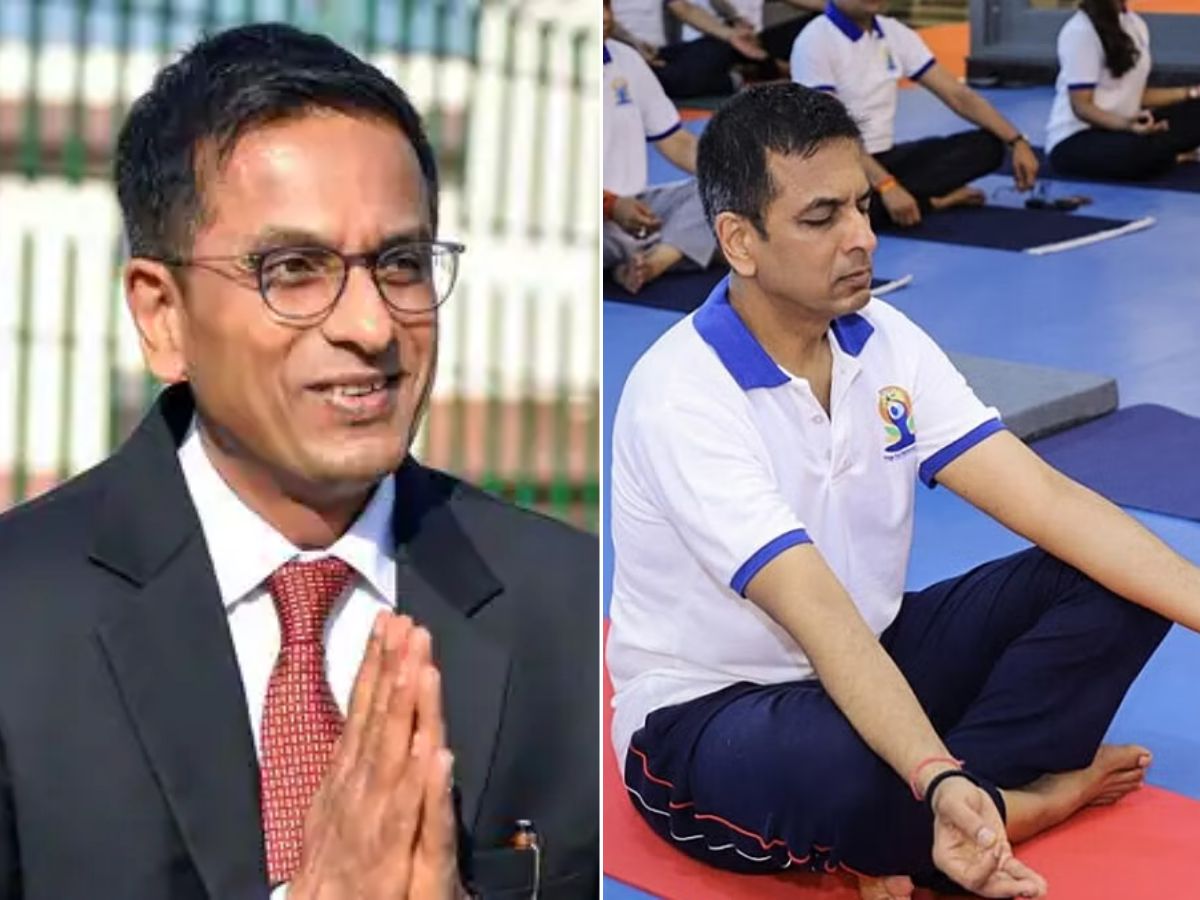
 A. J. Philip
A. J. Philip

By the time this appears in print, Chief Justice DY Chandrachud will have retired. In a recent speech, he wondered how posterity would evaluate him as a judge and Chief Justice of the Supreme Court. If he believed in the Hindu concept of duty, as enunciated by Lord Krishna at Kurukshetra, he should not have been concerned about his legacy.
Here, let me make a caveat: unlike many others who occupied the post of Chief Justice, I had great expectations from Chandrachud. He came across as a man of transparency who did not keep his private life hidden from the public. Everyone knew that he had adopted two disabled children, giving them all the love and care in the world.
Of course, I had read some of his judgments, which suggested that he had a sharp mind capable of both camouflaging and revealing complexities. The son of a former Chief Justice, he had the best of education, obtaining a PhD from one of the world's most esteemed institutions. Exposed to both Oriental and Occidental jurisprudence, I expected him to rise above the ordinary and end up as a great judge of the apex court.
My understanding of the law and my love for it began when Justice VR Krishna Iyer came to my alma mater, Catholicate College, Pathanamthitta, in 1969 or 1970. He was then a judge of the Kerala High Court. I don't remember much of his speech because, frankly, I don't think I understood it. He was at his flowery best, and I noticed even our principal, Dr J Alexander, who spoke good English, was at sixes and sevens trying to capture the essence of what he said.
I read all of Iyer's pieces in The Hindu, which would even serialise his articles on its editorial page. Nowadays, no newspaper serialises an article. His articles were a treat for me, though I often had to check the dictionary.
Here, let me quote Fali S Nariman: "People who attempt to ape him do not realise that his penchant for long words was not a studied exercise, for he spoke in court in the same vein. I once heard him deliver a judgment in Court No. 3 (where he sat) — an oral judgment, a judgment 'off the cuff' — where amongst several multi-syllable words he used one with six syllables: 'Ratiocination.' There were many litigants and some lawyers present in the court that day. Half of them, I am sure, could not pronounce the word, and most of the others did not know what it meant."
As a listener and reader, I knew of his proclivity for such language when I interviewed Justice Iyer during his visit to Patna in the eighties. Of course, I wasted most of the interview discussing the afterlife, on which subject he had made some controversial statements.
Justice Iyer was very fond of his wife. Her death was a tremendous shock for him, and he was unprepared for it. He experienced hallucinations that led him to claim he could converse with her. He even cited some scientific studies suggesting it was indeed possible to communicate with the dead.
A few years later, while I was at the Hindustan Times in Delhi, Editor HK Dua came to my cabin to hand me an article written by Justice Iyer. He wanted me to edit the article. I found it both a challenge and an honour. The editor told me that the author was known for his "purple patches," a term I didn't understand then. Nor did I have the courage to ask him, as he thought I was an authority on Iyer because we both hailed from Kerala.
Justice Iyer is credited with introducing into judicial pronouncements in India the "Purple Patch" (another term for a "purple passage"). Lord Denning explained the phrase as follows: "When you are covering as with a garment some weighty or important matter, you should sew on one or two purple passages so as to attract the attention of those unfamiliar with it." Justice Iyer's judgments are, needless to say, strewn with such purple patches.
My readers may wonder why I am going on and on about a judge who did not even become the Chief Justice of India. Justice Iyer served the Supreme Court for only seven years after he was elevated to the position from the Law Commission of India.
He was a puisne judge with hardly two years of experience as an SC judge when an appeal came before him, filed by then-Prime Minister Indira Gandhi. She had been found guilty of misusing her power during the election, and the Allahabad High Court had set aside her election to the Lok Sabha from Rae Bareli in Uttar Pradesh. The Court stayed the operation of its verdict for a month to allow her time to file an appeal in the Supreme Court.
It was the great lawyer Nani Palkhiwala who argued on behalf of Mrs Gandhi. He pointed to the political consequences of unseating a Prime Minister who enjoyed majority support in Parliament. Justice Iyer was bold enough to hear the case alone and deliver his verdict. He was not overawed by the argument that the heavens would fall if she lost the prime ministership.
It was one of the finest moments in the history of the Indian Judiciary when Justice Iyer read out the salient aspects of his verdict. He upheld the High Court's decision to unseat her, but he allowed her to continue as Prime Minister and take part in parliamentary debates. However, she was not permitted to vote in the House, as she had ceased to be a member following the Allahabad verdict.
Every major newspaper in the country published the full text of Justice Iyer's voluminous verdict, written in Queen's English and laced with several purple patches. I read it multiple times to grasp the full import of his arguments. Justice Iyer, who was the Law Minister in the first EMS Namboothiripad ministry in Kerala, never tried to conceal his political leanings.
In fact, Justice Iyer once said, "Law without politics is blind, politics without law is deaf." He would rather do justice by overriding the law than administer what he believed was injustice according to the law. "The myth is that courts of law administer justice; the truth is that they are agents of injustice," he claimed.
What occasioned these reflections is a reference to Justice Iyer in a majority judgment delivered by Chief Justice DY Chandrachud: "The role of this Court is not to lay down economic policy, but to facilitate the framers' intent to lay down the foundation for an economic democracy. The Krishna Iyer doctrine does a disservice to the broad and flexible spirit of the Constitution."
This was a harsh, unwarranted comment on a judge who had shared the Bench with his father, the 16th Chief Justice of India, Justice YV Chandrachud. As I mentioned, Justice Iyer never made it to the post of CJI. Yet few judges have made as profound an impact on the Supreme Court as he did. He heard as many as 700 cases, either alone or in panels, and wrote the judgment in more than half of them.
Small wonder that even today, an argument invoked in courts from the Supreme Court down is that "bail is the norm, jail is the exception." Iyer also lamented the inability of courts to deliver timely justice. He begins one judgment with the words: "Instant or early justice seems impossible without radical reorientation and systematic changes in the judicial process, as these two appeals, which have survived two decades, sadly illustrate."
When CJI Chandrachud's draft verdict was circulated among the fellow judges on the Constitution Bench hearing the case, it elicited two quick responses from Justices BV Nagarathna and Sudhanshu Dhulia.
Taking strong exception to the "disservice" remark, Justice BV Nagarathna noted, "Merely because of the paradigm shift in the economic policies of the State to globalisation, liberalisation, and privatisation, compendiously called the 'Reforms of 1991,' which continue to this day, cannot result in branding the judges of this Court of the past as doing a disservice to the Constitution." She could not have put it more forthrightly.
Justice Dhulia, while endorsing the views of Justices Iyer and his fellow judge Chinappa Reddy, said, "Before I conclude, I must also record my strong disapproval of the remarks on the Krishna Iyer Doctrine as it is called. This criticism is harsh and could have been avoided."
He added, "The Krishna Iyer Doctrine—or, for that matter, the O Chinnappa Reddy Doctrine—is known to all who are connected to law or life. It is based on strong humanist principles of fairness and equity. It is a doctrine that has illuminated our path in dark times. Their long body of judgments is not just a reflection of their perspicacious intellect, but more importantly, of their empathy for the people, as human beings were at the centre of their judicial philosophy."
Justice Dhulia certainly understood Justice Iyer. "When Justice William Douglas retired from the Supreme Court of the US after a long tenure spread over three decades, a widely read magazine described him as the 'Court's grandest maverick, a rugged liberal with a shock of white hair, piercing eyes, and a luminous regard for the First Amendment.' It is a beautiful description. Substitute 'the Poor' for 'the First Amendment,' and the description would fit Justice Iyer.
When Justice Chandrachud realised that his harsh comment on Iyer would land him in trouble, he had it deleted from his judgment. Poor Justices Nagarathna and Dhulia were left with egg on their faces.
Had Justice Iyer been alive, he would have explained, with a lot of purple patches, how futile it is for a modern-day judge with access to the Internet and Artificial Intelligence to question a judicial system in vogue when Akbar the Great was the ruler. He would never have deleted a portion of his judgment after circulating it among his fellow judges.
A prolific writer, Justice Iyer often authored majority judgments and never considered it a bother, unlike a judge from Kerala who, in his long Supreme Court career, wrote only about half a dozen judgments. At no point in his career did he pronounce a majority verdict without signing it. That singular distinction goes to the five men in robes who authored the Ayodhya verdict and allegedly celebrated it in a seven-star hotel in Delhi, popping champagne.
From the writing style, I could tell who authored that verdict, though I could hardly imagine it was his personal deity, not his sense of justice, guiding him to write a judgment that accepted every Muslim point while handing over the contentious plot to the Hindus.
Justice Chandrachud alone has the distinction of inviting the Prime Minister to his home for a private puja, and with that, his sense of justice and fair play vanished. He also failed to show courage when it was required—like when the PM removed him from the panel to choose the Election Commission. He will have to atone for his failure to release Stan Swamy from jail when he was suffering from multiple ailments, including Parkinson's.
If I were to write an epitaph for Justice Iyer, it would read: "He lived a life devoted to serving the poor." Among the legal concepts he championed, none was more transformative than Legal Aid, a cornerstone of equality that brought the promise of justice within reach for the underprivileged. As for Chief Justice DY Chandrachud, I leave it to my readers to judge the legacy he will leave behind.